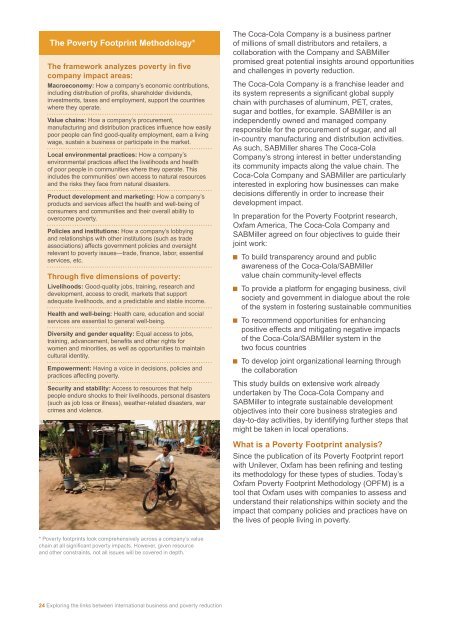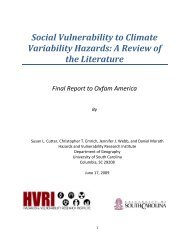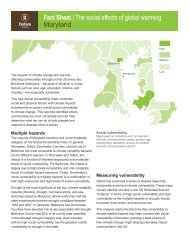Poverty Footprint Study on how the Coca Cola - Oxfam America
Poverty Footprint Study on how the Coca Cola - Oxfam America
Poverty Footprint Study on how the Coca Cola - Oxfam America
You also want an ePaper? Increase the reach of your titles
YUMPU automatically turns print PDFs into web optimized ePapers that Google loves.
The <str<strong>on</strong>g>Poverty</str<strong>on</strong>g> <str<strong>on</strong>g>Footprint</str<strong>on</strong>g> Methodology*<br />
The framework analyzes poverty in five<br />
company impact areas:<br />
Macroec<strong>on</strong>omy: How a company’s ec<strong>on</strong>omic c<strong>on</strong>tributi<strong>on</strong>s,<br />
including distributi<strong>on</strong> of profits, shareholder dividends,<br />
investments, taxes and employment, support <strong>the</strong> countries<br />
where <strong>the</strong>y operate.<br />
Value chains: How a company’s procurement,<br />
manufacturing and distributi<strong>on</strong> practices influence <strong>how</strong> easily<br />
poor people can find good-quality employment, earn a living<br />
wage, sustain a business or participate in <strong>the</strong> market.<br />
Local envir<strong>on</strong>mental practices: How a company’s<br />
envir<strong>on</strong>mental practices affect <strong>the</strong> livelihoods and health<br />
of poor people in communities where <strong>the</strong>y operate. This<br />
includes <strong>the</strong> communities’ own access to natural resources<br />
and <strong>the</strong> risks <strong>the</strong>y face from natural disasters.<br />
Product development and marketing: How a company’s<br />
products and services affect <strong>the</strong> health and well-being of<br />
c<strong>on</strong>sumers and communities and <strong>the</strong>ir overall ability to<br />
overcome poverty.<br />
Policies and instituti<strong>on</strong>s: How a company’s lobbying<br />
and relati<strong>on</strong>ships with o<strong>the</strong>r instituti<strong>on</strong>s (such as trade<br />
associati<strong>on</strong>s) affects government policies and oversight<br />
relevant to poverty issues—trade, finance, labor, essential<br />
services, etc.<br />
Through five dimensi<strong>on</strong>s of poverty:<br />
Livelihoods: Good-quality jobs, training, research and<br />
development, access to credit, markets that support<br />
adequate livelihoods, and a predictable and stable income.<br />
Health and well-being: Health care, educati<strong>on</strong> and social<br />
services are essential to general well-being.<br />
Diversity and gender equality: Equal access to jobs,<br />
training, advancement, benefits and o<strong>the</strong>r rights for<br />
women and minorities, as well as opportunities to maintain<br />
cultural identity.<br />
Empowerment: Having a voice in decisi<strong>on</strong>s, policies and<br />
practices affecting poverty.<br />
Security and stability: Access to resources that help<br />
people endure shocks to <strong>the</strong>ir livelihoods, pers<strong>on</strong>al disasters<br />
(such as job loss or illness), wea<strong>the</strong>r-related disasters, war<br />
crimes and violence.<br />
* <str<strong>on</strong>g>Poverty</str<strong>on</strong>g> footprints look comprehensively across a company’s value<br />
chain at all significant poverty impacts. However, given resource<br />
and o<strong>the</strong>r c<strong>on</strong>straints, not all issues will be covered in depth.<br />
24 Exploring <strong>the</strong> links between internati<strong>on</strong>al business and poverty reducti<strong>on</strong><br />
The <strong>Coca</strong>-<strong>Cola</strong> Company is a business partner<br />
of milli<strong>on</strong>s of small distributors and retailers, a<br />
collaborati<strong>on</strong> with <strong>the</strong> Company and SABMiller<br />
promised great potential insights around opportunities<br />
and challenges in poverty reducti<strong>on</strong>.<br />
The <strong>Coca</strong>-<strong>Cola</strong> Company is a franchise leader and<br />
its system represents a significant global supply<br />
chain with purchases of aluminum, PET, crates,<br />
sugar and bottles, for example. SABMiller is an<br />
independently owned and managed company<br />
resp<strong>on</strong>sible for <strong>the</strong> procurement of sugar, and all<br />
in-country manufacturing and distributi<strong>on</strong> activities.<br />
As such, SABMiller shares The <strong>Coca</strong>-<strong>Cola</strong><br />
Company’s str<strong>on</strong>g interest in better understanding<br />
its community impacts al<strong>on</strong>g <strong>the</strong> value chain. The<br />
<strong>Coca</strong>-<strong>Cola</strong> Company and SABMiller are particularly<br />
interested in exploring <strong>how</strong> businesses can make<br />
decisi<strong>on</strong>s differently in order to increase <strong>the</strong>ir<br />
development impact.<br />
In preparati<strong>on</strong> for <strong>the</strong> <str<strong>on</strong>g>Poverty</str<strong>on</strong>g> <str<strong>on</strong>g>Footprint</str<strong>on</strong>g> research,<br />
<strong>Oxfam</strong> <strong>America</strong>, The <strong>Coca</strong>-<strong>Cola</strong> Company and<br />
SABMiller agreed <strong>on</strong> four objectives to guide <strong>the</strong>ir<br />
joint work:<br />
To build transparency around and public<br />
awareness of <strong>the</strong> <strong>Coca</strong>-<strong>Cola</strong>/SABMiller<br />
value chain community-level effects<br />
To provide a platform for engaging business, civil<br />
society and government in dialogue about <strong>the</strong> role<br />
of <strong>the</strong> system in fostering sustainable communities<br />
To recommend opportunities for enhancing<br />
positive effects and mitigating negative impacts<br />
of <strong>the</strong> <strong>Coca</strong>-<strong>Cola</strong>/SABMiller system in <strong>the</strong><br />
two focus countries<br />
To develop joint organizati<strong>on</strong>al learning through<br />
<strong>the</strong> collaborati<strong>on</strong><br />
This study builds <strong>on</strong> extensive work already<br />
undertaken by The <strong>Coca</strong>-<strong>Cola</strong> Company and<br />
SABMiller to integrate sustainable development<br />
objectives into <strong>the</strong>ir core business strategies and<br />
day-to-day activities, by identifying fur<strong>the</strong>r steps that<br />
might be taken in local operati<strong>on</strong>s.<br />
What is a <str<strong>on</strong>g>Poverty</str<strong>on</strong>g> <str<strong>on</strong>g>Footprint</str<strong>on</strong>g> analysis?<br />
Since <strong>the</strong> publicati<strong>on</strong> of its <str<strong>on</strong>g>Poverty</str<strong>on</strong>g> <str<strong>on</strong>g>Footprint</str<strong>on</strong>g> report<br />
with Unilever, <strong>Oxfam</strong> has been refining and testing<br />
its methodology for <strong>the</strong>se types of studies. Today’s<br />
<strong>Oxfam</strong> <str<strong>on</strong>g>Poverty</str<strong>on</strong>g> <str<strong>on</strong>g>Footprint</str<strong>on</strong>g> Methodology (OPFM) is a<br />
tool that <strong>Oxfam</strong> uses with companies to assess and<br />
understand <strong>the</strong>ir relati<strong>on</strong>ships within society and <strong>the</strong><br />
impact that company policies and practices have <strong>on</strong><br />
<strong>the</strong> lives of people living in poverty.




